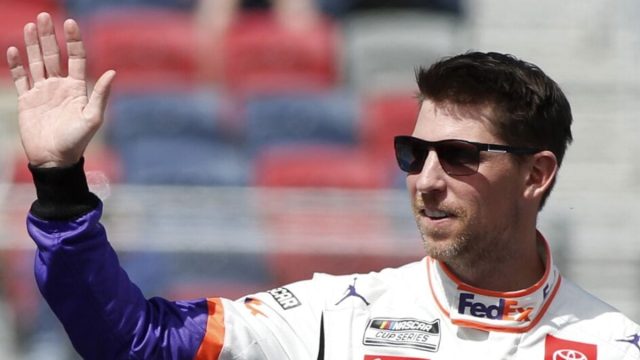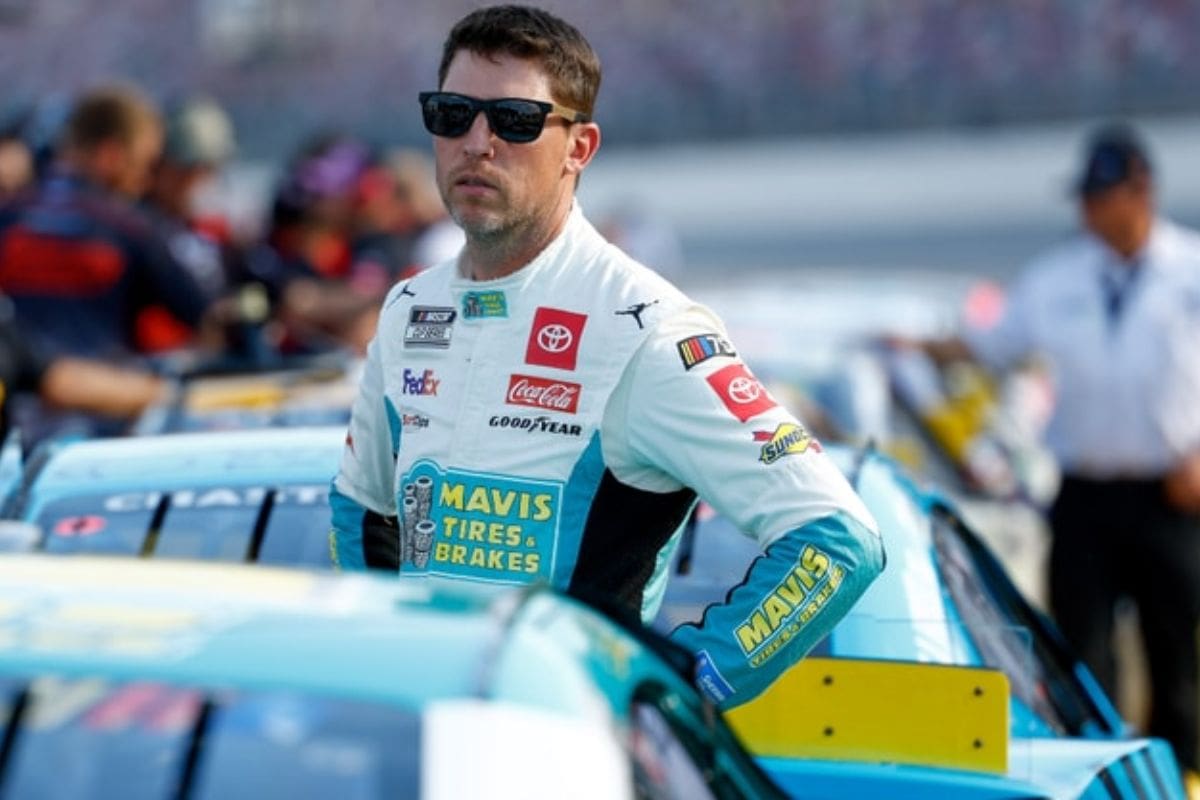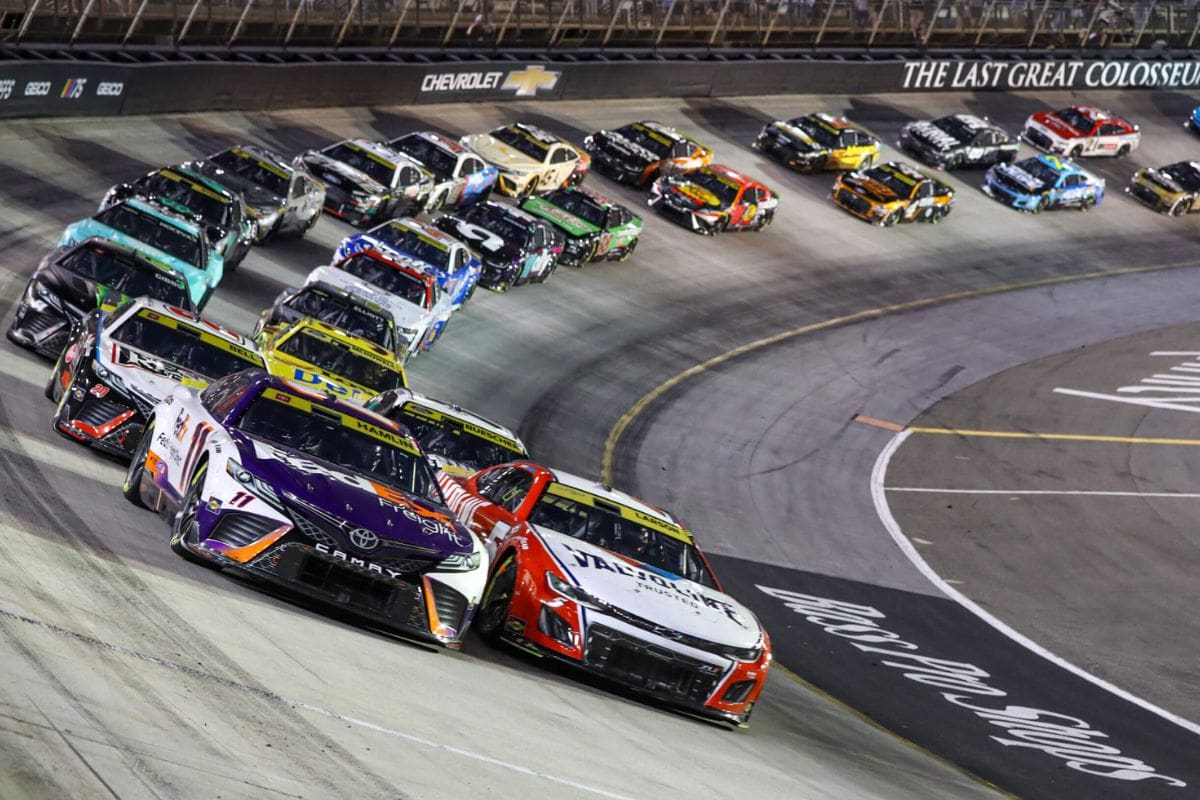Denny Hamlin Points Finger at NASCAR: Denny Hamlin‘s recent criticisms of NASCAR’s decision to include Watkins Glen in the Round of 16 have sparked a notable conversation about the integrity of the playoff structure. His concerns center on how the introduction of road courses alters the competitive landscape, potentially undermining the foundation that has traditionally governed the sport. As established contenders face the risk of early elimination due to unpredictable outcomes, the implications for competitive balance and strategy in NASCAR warrant further exploration. What changes could this mean for the future of playoff dynamics?
Key Highlights
- Denny Hamlin criticizes NASCAR’s decision to include Watkins Glen in the Round of 16, disrupting traditional playoff formats.
- The addition of two road courses increases unpredictability, endangering top contenders’ chances for advancement.
- Hamlin expresses concerns about the fairness and integrity of the playoff system with new track formats.
- He highlights the unique challenges of road course racing, which can lead to early eliminations of established drivers.
- The evolving landscape of younger drivers excelling in road course racing further complicates playoff dynamics, according to Hamlin.
Denny Hamlin Criticizes NASCAR’s Playoff Schedule
Denny Hamlin has expressed considerable concerns regarding NASCAR‘s decision to incorporate the Watkins Glen International road course into the first round of the playoffs. This controversial inclusion represents a notable shift in the playoff structure, which has traditionally included a single road course in the postseason. By placing Watkins Glen in the Round of 16, NASCAR introduces a potential disruption to the qualifying drivers who are vying for a spot in the coveted Championship 4.
Hamlin’s write up stems from the belief that this change could risk the chances of established competitor. The chance in road course racing, as opposed to oval tracks, increases the likelihood of unexpected outcomes that could eliminate top drivers from championship rivalry early in the playoffs.
Historically, playoff races have favored drivers who excel on oval tracks, and the introduction of two road course events—Watkins Glen and the Charlotte Roval—may skew the competitive balance.
The planned implications are wise drivers who have put an edge on their skills on traditional tracks may find themselves at a disadvantage against those adept at guide the complications of road tracks.
Hamlin’s understanding highlight a broader concern regarding the integrity and fairness of the playoff system, particularly as it concern to the drivers’ ability to advance based on their performance rather than the inherent uncertainties of the race format.
As NASCAR continues to evolve, the ramifications of this decision warrant careful examination, especially for those aspiring to secure a position in the Championship 4.
Hamlin’s Concerns and Predictions
Concerns surrounding NASCAR’s revised playoff structure extend beyond mere scheduling changes, as drivers like Hamlin predict considerable implications for championship contenders.
During a recent episode of the Dirty Mo Media podcast, Hamlin articulated his concern regarding the inclusion of another road course to the playoff lineup. He highlighted the potential for “final four contenders” to be eliminated in the initial round, a scenario he believes NASCAR may intentionally encourage to amplify competition.
“You could have some final four contenders go out in the first round. I think that’s what they (NASCAR) want. Added another road course, it certainly adds some variables that all of us drivers are going to have to make sure that we’re doing the best we can and for us personally, it’s going to be avoiding those 25th or worse place finishes.” (Hamlin)
Hamlin emphasized the unpredictable nature of road course racing, stating, “It certainly adds some variables that all of us drivers are going to have to make sure that we’re doing the best we can.” He pointed out the critical importance of avoiding subpar finishes, particularly those below 25th place, as a key factor in advancing through the playoffs.
What do you think is going to be the biggest first-round upset? 🤔 pic.twitter.com/hilEPX8wHJ
— Dirty Mo Media (@DirtyMoMedia) September 3, 2024
The irregular race outcomes become visible, and Hamlin expressed uncertainty about the safety of any contender, given how these races can unfold unexpectedly.
The legendary driver’s predictions reflect a broader anxiety within the racing community about the integrity of the playoff system. With the revamped structure, the inherent unpredictability of the new tracks could lead to considerable shake-ups, potentially undermining the meritocratic nature of the championship.
“That will be the key to us moving on, but I just don’t know that anybody is safe with what tracks we’re going to and how erratic some of these races are playing out. You just never know.” – hamlin
As teams prepare for the upcoming challenges, Hamlin’s insights serve as a poignant reminder of the delicate balance between competition and strategy in NASCAR’s evolving landscape.
Road Course Racing Dynamics
Amid the complexities of NASCAR, road course racing presents a unique set of challenges that notably differ from traditional oval tracks. Unlike ovals, where the focus is primarily on acceleration due to the absence of sharp turns, road courses require drivers to navigate a labyrinth of left and right turns, amplifying the importance of braking.
This dynamic notably alters race strategies, as drivers must continuously gauge their braking points and manage tire wear.
Key dynamics of road course racing include:
- Braking accuracy: Drivers must execute right braking to maintain speed through tight corners, a skill that can make or break a race.
- Constant Positioning: The lack of a substantial lead means drivers are perpetually under the threat of rivals closing in, necessitating constant defensive driving.
- Increased Risk of tragedy: A single miscalculation can lead to disastrous multi-car wrecks, highlighting the sport’s inherent unpredictability.
- Strategic Adaptability: Drivers must adjust their strategies based on track conditions and the behavior of competitors, moving to more dynamic racing environment.
As teams prepare for road course events, understanding these dynamics becomes essential for success. Mastery over braking techniques, cornering strategies, and real-time decision-making can distinguish contenders in the high-stakes area of road track racing.
Hamlin’s Top Road Course Drivers
In evaluating the landscape of road course racing, several drivers consistently emerge as guide, impressive skill and adaptability on these challenging tracks. Denny Hamlin, a seasoned veteran with 54 Cup victories to his name, has identified key competitors who excel in this domain, reflecting both current form and potential.
Hamlin specifically highlights William Byron, Christopher Bell, Ty Gibbs and Tyler Reddick as the elite road course drivers. Reddick stands out with three road course wins, demonstrating a alarming ability to navigate these lap. Meanwhile, Byron and Bell have each secured two victories, emphasizing their competitiveness and consistency.
“I think that there’s five that’s probably gonna jump out at me when I look at it. I’m gonna say (William) Byron, (Christopher) Bell, I think Ty Gibbs, (Tyler) Reddick. I think those are the ones that will always be the fastest. I mean you could throw (AJ) Allmendinger in there but even he didn’t look I don’t know just over the last few years just not it seems like these guys these younger guys have caught him for sure skill set wise.” – Hamlin
Gibbs, despite being relatively new, has proven his expertise in the Xfinity Series, winning four road course races before making strides in the Cup Series, including victories at the Daytona Road Course and Watkins Glen.
While Hamlin acknowledges AJ Allmendinger’s historical significance in road course racing, he observes a shift in the competitive landscape, noting that younger drivers have surpassed Allmendinger in recent performance. This formation change reveals a growing depth of talent in road course racing, as evidenced by the successes of these younger athletes.
News in Brief: Denny Hamlin Points Finger at NASCAR
Denny Hamlin’s criticisms regarding NASCAR’s incorporation of Watkins Glen into the Round of 16 highlight crucial concerns about the integrity and fairness of the playoff structure. The inclusion of multiple road may throw into confusion competitive balance, potentially disadvantaging top contenders. Such changes raise vital questions about merit-based advancement in the championship and emphasize the need for a careful evaluation of the implications of altering traditional racing formats in chasing of unpredictability.
ALSO READ: Denny Hamlin Demands Big Things From Tyler Reddick After Darlington’s Mixed Results



